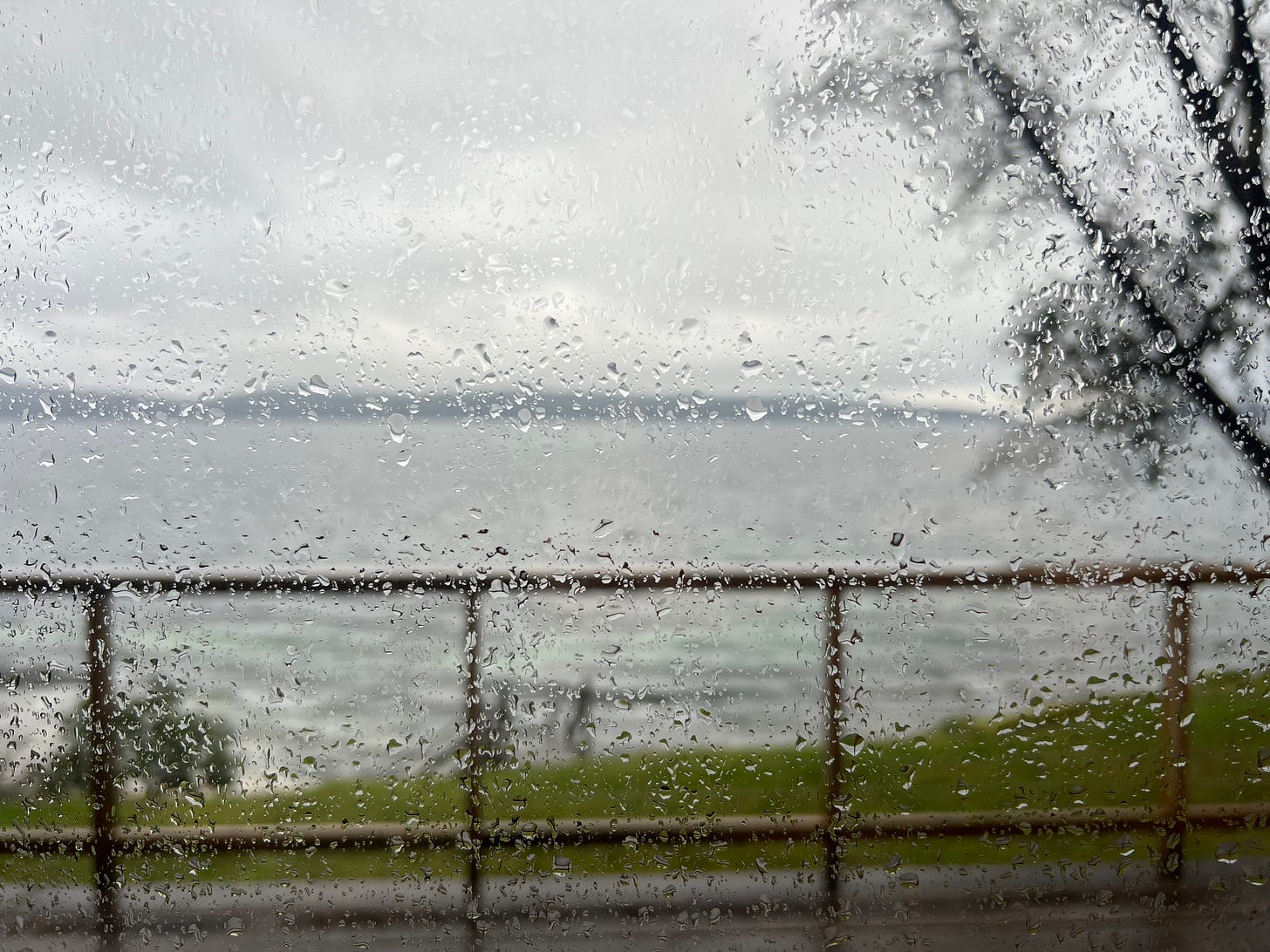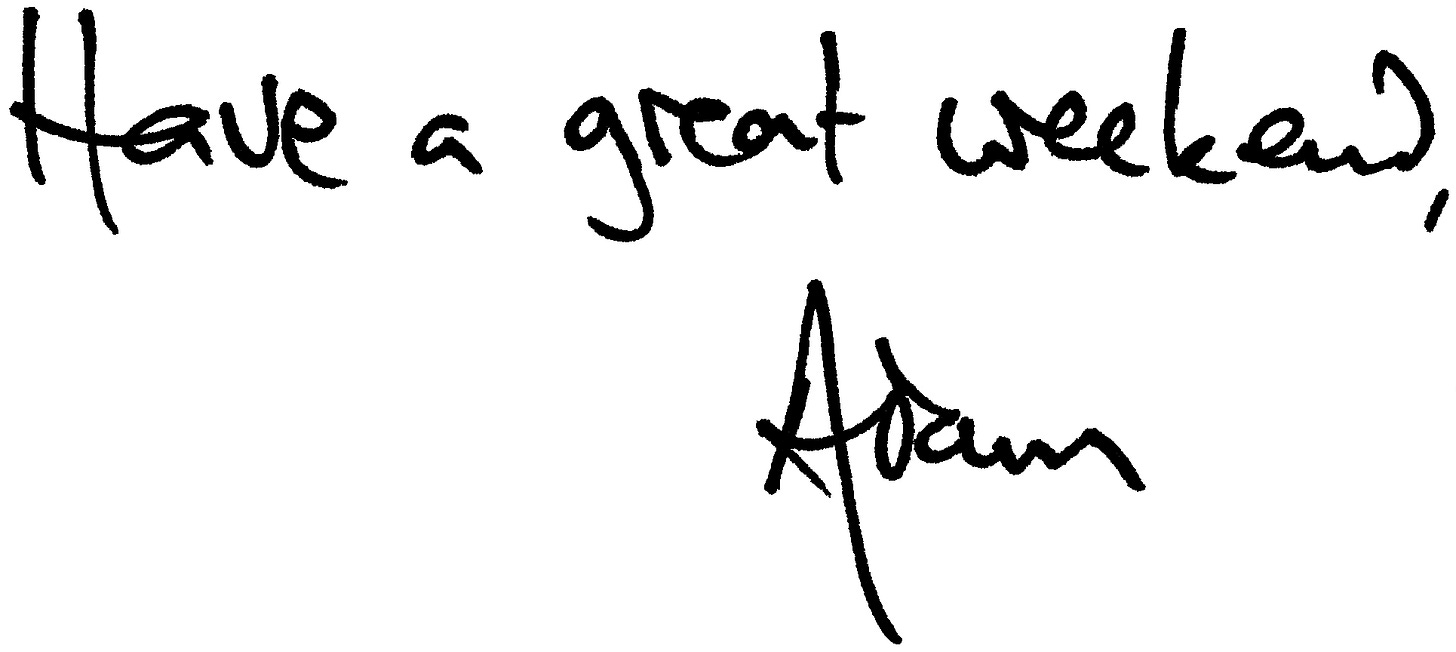Surviving Winter Working Life
And more ...
Surviving Winter Working Life
In most of North America, the clocks go back in two weeks’ time. In most of Europe it’s in a week.1
This is the trigger, for me, for becoming a grumpy git. Leaving for work in the dark, leaving work in the dark, often seeing no daylight. Days are cold, dark, and rainy. My patients become morose, battling tonsillitis and family feuds. Deciduous trees are bare; there’s less birdsong; and everything’s muddy. More to do to keep the house warm, the vehicle running, feet dry. I sleep less well, eat too much, and become lethargic and crotchety. Until the first sounds and smells of spring, I’m no fun for my colleagues, patients, or partner.
What I Used To Do
A while back, at this time of year, I began reading and trying to follow a note to myself that I nerdily refined over several years. It reminded me how badly I deal with the winter, and encouraged me to take on fewer commitments, plan holidays, keep warm and dry, read more fiction, keep running regularly, ration my screen time, and make an effort to see (and probably depress) friends.
And, the last few years, I’ve tried using a bright light regularly each morning. There’s pretty good evidence this works for seasonal major depressive disorder (i.e. worse than me) and some evidence that it helps with milder symptoms (probably me at times). Impossible to be sure how much it helped me (I’m not a well-powered, randomized, placebo-controlled trial). But it was easy, safe, cheap, and only a little weird.
I think some of this did help, especially the stuff about spending my days well. But winters were still a struggle. I certainly hadn’t fixed the problem.
So this spring I was excited to come across a book, published last year by an academic psychologist, Kari Leibowitz, called How to Winter: Harness Your Mindset to Thrive on Cold, Dark, or Difficult Days.2 I read it. It’s great. And I’ve been saving it up for you ever since.
Winter Mindset
Leibowitz is part of a school of psychologists, many of them Stanford University-based, interested in the extraordinary extent to which what we expect to happen affects our experience of things. There’s a life-changing book about this by science writer David Robson called The Expectation Effect. (Highly-recommended.) Teachers and others are familiar with this from the ideas of growth mindset and its evil nemesis, fixed mindset. It’s near the heart of that most evidence-based of psychological therapies, cognitive-behavioral therapy. And it’s a major influence on some of the ideas underpinning this newsletter and the book I’m writing about all this.
The line Leibowitz takes, informed by her own research, is this: what separates those who thrive during the winter from grumpy winterers like me is our winter mindsets. Think of winter positively, as something to look forward to, and you’ll enjoy it. Think of it negatively and of course it’s going to make you grumpy.
In other words, my note to myself, reminding myself (as if an immutable fact) that I handle winter badly, got it all wrong. I should have been looking for things about the winter to relish.
And there are plenty of those. They depend on who, and where, you are. Some of mine: sunny winter walks. Winter food. Quiet evenings with candles and a fire and everything warm while a storm rages outside. Hygge. The peaceful sound of rain on the roof at night. The best sunrises. Freshly-fallen snow. Baking. Even some winter jobs, like clearing the roof gutters, or bringing in firewood, can be simple and satisfying. (Nature and the outdoors are vital to my wellbeing.) If you’re a city-dweller, your list may be different. But it can be just as long and just as good.
It’s a change of mindset, and I’m feeling energized and newly positive just by making that mental shift. Here comes winter: it’ll be fun; I’m going to make the most of it and focus on the good stuff; and it’ll be spring before I know it.
Leibowitz’s How to Winter has lots of practical advice. Here are just a few of her suggestions:
Consider and focus on what you’re going to enjoy about winter.
Plan a celebration for the night the clocks go back.
Challenge your negative thoughts about winter. Remember: often it’s your reaction, not the situation. Might you be overreacting? Are you prone to dwell on the things you don’t like about winter, at the cost of the fun bits and your mood?
Spend time outdoors, and pay attention to nature. It’s still there and it’s wonderful even in winter. Keep on getting exercise, outdoors, if that’s right for you.
Explore ‘slow hobbies’—whether things you already enjoy or something new. Winter can be a season for slowing down, for doing less, and prioritizing restful things you enjoy.
Smaller lamps, candles, a fire if you can, and overhead lights off.
Speak up for winter with others. As Leibowitz writes, ‘Saying “It feels so good in here” upon entering somewhere warm has a completely different effect than “It’s so gross out.”3 By focusing on the positives of winter with others, you may improve not only their winters, but also your own winter mindset.
There are many more ideas in How to Winter but, more than that, the book captures the spirit of relishing the colder, darker months in the northern climes where it was researched. If you’re like me, if winter can grind you down, I’d really recommend you read it.
Multi-tasking, time-boxing, and gender
My last piece was about time-boxing. In a hilarious and wonderful comment, Great Work reader Katie Thrower speculated about whether women are, on average, better at juggling multiple things at once and whether time-boxing may be more useful to men.
There’s a serious point. And there is, I think, an answer.
First, what people are generally talking about when they say ‘multi-tasking’ is actually rapid task-switching. And there’s copious evidence that task-switching is terrible for everyone’s performance.4
Secondly, the gender difference thing is actually quite well-researched and the evidence is that that stereotype doesn’t reflect reality. The best study I’m aware of is Patricia Hirsch, Iring Koch, and Julia Karbach, “Putting a Stereotype to the Test: The Case of Gender Differences in Multitasking Costs in Task-Switching and Dual-Task Situations,” PLOS ONE 14, no. 8 (August 14, 2019): e0220150, https://doi.org/10.1371/journal.pone.0220150.
My guess is that what’s going on is that many women’s lives require an awful lot of task switching, to which women adapt, and by which women are disadvantaged.
Podcast
As well as the podcast version of this newsletter (above), I sometimes talk about Great Work ideas on other people’s podcasts. My Robot Boss is the brilliant Devon Forster McConnell’s podcast about how AI is affecting, and may affect, work and leadership. In her latest episode (below), we discuss being ground down by work you care about, AI in medicine, and more. Do consider signing up for My Robot Boss (Apple Podcasts, Spotify): it’s interesting stuff, whatever your perspective on AI.
Apple Podcasts
Spotify
An update …
It’s an exciting time at Great Work Towers! This weekend I head to the remote Indigenous reserve where, for the last few years, I’ve worked as a doctor for two weeks a month. This’ll be my last trip there for now—which is poignant, as it’s the most fulfilling work I’ve ever done, in a community that’s been extraordinarily welcoming to me and that has come to mean much to me. But I need a break (as I wrote about here) and the time has come to do some serious work on the book that’s behind this project.
So, from November, I’ll be taking a writing sabbatical, focusing on turning the first draft of the Great Work book into a second draft, and getting things ready to approach agents and publishers toward the beginning of next year. My own wintering project—and I’m really excited about it.
New here? Or have you, through some terrible oversight, not joined this community of people who do tough work that matters? Sign up! It’s free, bullshit-free, and not selling anything.
And, if you found this useful, do send it to others who might too. Thank you!
Connect with me elsewhere (a nervous experiment)
LinkedIn • TikTok • Instagram • YouTube • Threads • Facebook
And apologies to the 100-ish Great Work readers in the Global South and Australasia for the mistiming. You may want to save this one for the right time of year!
Leibowitz, Kari. How to Winter: Harness Your Mindset to Thrive on Cold, Dark, or Difficult Days. Penguin Life, 2024.
Ibid., page 123.
Robert D. Rogers and Stephen Monsell, “Costs of a Predictible [sic] Switch between Simple Cognitive Tasks,” Journal of Experimental Psychology: General 124, no. 2 (1995): 207–31, https://doi.org/10.1037/0096-3445.124.2.207; Renata F. I. Meuter and Alan Allport, “Bilingual Language Switching in Naming: Asymmetrical Costs of Language Selection,” Journal of Memory and Language 40, no. 1 (January 1, 1999): 25–40, https://doi.org/10.1006/jmla.1998.2602; Joshua S. Rubinstein, David E. Meyer, and Jeffrey E. Evans, “Executive Control of Cognitive Processes in Task Switching,” Journal of Experimental Psychology: Human Perception and Performance 27, no. 4 (2001): 763–97, https://doi.org/10.1037/0096-1523.27.4.763; Ulrich Mayr and Reinhold Kliegl, “Task-Set Switching and Long-Term Memory Retrieval,” Journal of Experimental Psychology: Learning, Memory, and Cognition 26, no. 5 (2000): 1124–40, https://doi.org/10.1037/0278-7393.26.5.1124.










This is interesting to me! I live somewhere with very long, *very* dark winters, and November in particular tends to be awful because it is wet instead of snowy, and so it's just very dark. It's not that unusual to have fewer than twenty hours of sunshine over the whole month.
Two things have helped. First, I came to realise that I love the darkness – what I didn't like about it in a different urban environment was that it was associated with danger. Take that away (and add a therapy light, yes) and darkness becomes cozy, for me.
Second, and this differs from the theme of the post, but has worked very reliably for me. When November is coming, I say to myself, "This is going to be a very terrible month, but you'll get through it and then it's Christmas time. Just be ready for a finite period of misery." And then when November is actually happening, I tend to think, "Wow, this isn't so bad after all!"
It still has to do with expectations, somehow: I expect it to be terrible, I tell myself I can handle it, and then when it isn't the absolute worst time ever, I feel like I lucked out. This works even though I know I'm tricking myself, and I am pretty sure it really does work, because one year I forgot to mentally prepare myself, and midway through the month was wondering why life seemed so drab and joyless.
I wonder how this experience interacts with Leibowitz's findings. I do honestly love the winter and so many things about it, but I'm okay with not liking November (but, I guess, secretly liking it, too).
Immediately went and waitlisted for that book at the library!
I read once to think of winter as a hibernation season. Things will slow down, evenings may be calmer and more full of things like watching a show or reading a book... It helped me to realize I don't need to have the same expectations of myself that I do during the summer when days are long.